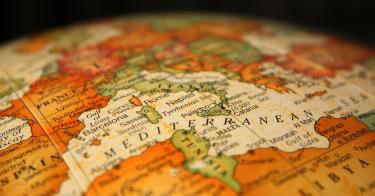Since ancient times, Mare Nostrum, the Mediterranean Sea, has been a strategic and commercial super highway connecting the world. It remains so today.
The Strait of Sicily, for instance, is the junction of the main maritime routes connecting the eastern and western oceanic areas, two quadrants of fundamental commercial and geopolitical importance. This makes it a choke point, with high strategic value for the entire Transatlantic community.
The Mediterranean connects the interests of the U.S. and Canada, North Africa, Central and Northern Europe, the Black Sea and Caucuses and Central Asia. Its airspace, surface, and underwater dimensions are all critically important. For example, gas pipelines fundamental for European energy supply and submarine cables for data transmission lie beneath the sea. Given the needs to maintain energy flows north and south, manage migration, and assure maritime security, a free and open Mediterranean Sea is a clear priority for the U.S. and Europe.
Russia’s invasion of Ukraine has brought renewed attention to both the fragility and importance of the greater Mediterranean region. There has been much talk about energy supply lines and infrastructure—and rightly so, given the conflict’s disruption of the global energy market. But this region’s role in digital connections is equally critical. This combination of factors makes the Mediterranean a sensitive and delicate area for Western stability and security.
>>> Meloni and Italy’s Conservatives Will Strengthen Transatlantic Relations
In this context, the area of strategic interest must be seen not just as a simple surface-sea area but as an “enlarged Mediterranean,” a region that stretches from continental Europe (including the Balkans and the Black Sea) to the northern and sub-Saharan belt of the African continent (from the Horn of Africa to the Gulf of Guinea), and stretching from the Persian Gulf to the Atlantic coasts. This quadrant of primary interest contains a number of hostile state and non-state actors who jeopardise the security of the Transatlantic community.
One often overlooked actor is China. Beijing continues its effective campaign to increase its influence and leverage in the Mediterranean basin, just as it has done for years in Africa and the Middle East. Thus far, Beijing has focused mainly on expanding its presence in the region’s economic and commercial spheres. It has made huge investments in infrastructure and seeks to control ports in the region. For example, China is trying to control the Port of Trieste in the Upper Adriatic as the final terminal of the Silk Road.
Russia, too, has restarted a significant influence action. It has increased its fleet in the Mediterranean, which now includes even more ships than Moscow floated there during the Cold War.
Also meriting more attention is the rise of international terrorism in the Sahel. Instability there has favoured the proliferation of jihadist movements, as well as migratory flows that can be manipulated by hostile actors to destabilize some European countries.
>>> The United States, Italy, and Winning the Med
One bright spot in the region is Italy. Geographically positioned to play a leading security role in the area, the new Italian government recognizes it has an acute national interest in doing so. Indeed, it has already taken action. Leaders of the new center-right government have already visited crisis areas throughout the region: Libya, Algeria, Tunisia, Egypt, the Balkans, and Iraq. Prime Minister Giorgia Meloni, Foreign Minister Antonio Tajani, Interior Minister Matteo Piantedosi, and Defense Minister Guido Crosetto have traveled to the region’s capitals to re-establish political relations, sign energy deals, and discuss stability and security issues.
While most of Europe remains focused on Ukraine, Italy seems ready to take on more responsibility for safeguarding the Mediterranean. Also, by participating in various NATO and EU initiatives, Rome can promote cooperation and burdensharing among partner countries. To truly lead, it will be important for Rome to commit itself to greater investment in the defense sector, working hard to complete the endowment of national defense systems by accelerating the production of strategic and high-tech equipment alongside the development of an all-domain mentality—one that includes cyber and space.
With its commitment to burdensharing and responsible regional leadership, Italy’s new government is a natural partner for the U.S. America, too, has a vested interest in a free and open Mediterranean. As Washington seeks to counter malicious and destabilizing influences from Russia and China, building a common security, engagement, and economic cooperation agenda with Rome makes sense.
This piece originally appeared in RealClear World




